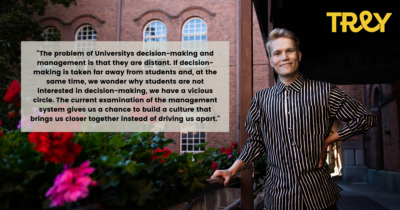I am on a lecture. Suddenly, out of nowhere, the lecturer says something that is clearly not true. One of my fellow students raises their hand and questions the statement. The lecturer is taken aback. I have faced similar confusion not only on lectures but also in every single administrative body I have been a part of during my studies. As if it was something new that I, a student, am ready to question things. That I am generally interested in things that happen around me.
I dare to argue that the reason for this astonishment is buried deep in the narrative built in universities and more widely in the educational affairs discussion in Finland. The narrative where students are not seen as an active part of the university community in the same way as research and teaching staff or professors. In this twisted story, students only pass through the university. The rest of the community will always be there.
It is narrow-minded to presume that students are not interested in their university’s decision-making. Students already participate in decision-making in various university bodies. In fact, the problem of decision-making and management is that they are distant. If decision-making is taken far away from students and, at the same time, we wonder why students are not interested in decision-making, we have a vicious circle. This is a very practical question that relates to, for example, what information is available to students and what confidential matters students are trusted with.
The University’s responsibility as an organisation is to increase the transparency of decision-making and bring decision-making closer to students. If all activity at the University is lead with principles that are not visible to the community and that the community cannot influence, we are dangerously sliding towards the dark side of democratic decision-making. Decision-making and management are not only about rules and documents. They are also made up of working culture, everyday matters, and commonly approved values.

University democracy is easy to break with a decision that has not been prepared with the whole university community. The tripartite principle is a central building block in the decision-making of universities, and it cannot be sacrificed for efficiency. Without a genuine possibility for the whole university community to participate in decision-making on all levels of administration, we cannot speak of commonly accepted values or a working culture that is based on a joint decision. If even one group of the tripartite is left out of preparation and decision-making, the decision has no foundation.
In the centre of all that was mentioned above, is respect. The purpose of the examples in the beginning was to reveal the unfortunate truth that students are not always appreciated when they are active. We have built a system that does not encourage students to question and does not see student activity as something worth of respect. The value of a student should not only be measured in the duration of studies or the transition to working life but in active participation during studies.
We now have a chance to repair the damaged system here in Tampere. The current examination of the management system gives us a chance to build a culture that brings us closer together instead of driving us apart. In addition, we need to change how we show each other respect. This change begins with correcting the story in a way that students are also seen as a valuable and active part of the University. Always.